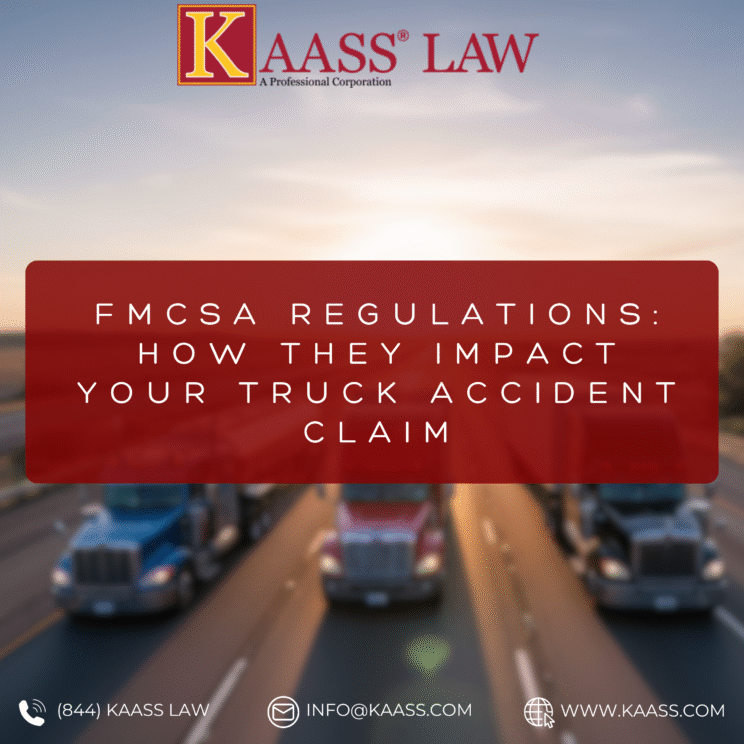When a large commercial truck is involved in an accident, the consequences are often devastating. Furthermore, these incidents are rarely simple. Unlike a typical car crash, a complex and detailed set of federal rules governs every aspect of a trucking company’s operations. These are the Federal Motor Carrier Safety Regulations (FMCSA Regulations). For victims of truck accidents, understanding the role these regulations play is absolutely critical. This knowledge helps prove fault and secure fair compensation.
Violating these safety rules is not just a mistake; it can be direct evidence of negligence. This article will explain what the FMCSA Regulations are, what they cover, and how an experienced truck accident attorney uses them to build a strong personal injury case in California.
What Are the FMCSA Regulations?
The Federal Motor Carrier Safety Administration (FMCSA) is the agency within the U.S. Department of Transportation that regulates the trucking industry. Its primary mission is to reduce crashes, injuries, and fatalities involving large trucks and buses. To achieve this, the agency develops and enforces a comprehensive set of safety rules. We know these rules as the FMCSA Regulations.
According to the FMCSA, these rules apply to most commercial motor vehicles (CMVs). They also apply to the companies that operate them (motor carriers). The regulations are extensive. Lawmakers designed them to ensure that drivers are qualified, vehicles are safe, and companies operate responsibly.
Key Areas Covered by FMCSA Regulations
The FMCSA Regulations are vast, but several key areas are frequently central to truck accident claims. An attorney will investigate a trucking company’s compliance in all of these areas after a crash.
Hours of Service (HOS) Rules
Driver fatigue is a leading cause of catastrophic truck accidents. To combat this, the FMCSA created strict Hours of Service (HOS) rules that dictate:
- The maximum number of hours a driver can be on duty and drive in a 24-hour period.
- The minimum number of off-duty hours and rest breaks a driver must take.
- How drivers must log their hours using an Electronic Logging Device (ELD).
According to the FMCSA’s Hours of Service rules, these regulations are designed to ensure drivers are rested and alert behind the wheel.
Driver Qualification Standards
A trucking company cannot simply hire anyone to drive an 80,000-pound vehicle. In fact, the regulations require motor carriers to maintain a detailed “driver qualification file” for every driver. This file ensures each driver:
- Has a valid Commercial Driver’s License (CDL).
- Has passed a medical examination.
- Has a driving record that the company has reviewed.
- Has passed required drug and alcohol tests.
Vehicle Maintenance and Inspection
Trucking companies have a legal duty to systematically inspect, repair, and maintain their vehicles. The regulations require:
- Regular, documented vehicle inspections.
- Records of all maintenance and repairs.
- Daily Driver Vehicle Inspection Reports (DVIRs).
A crash caused by faulty brakes or a tire blowout, for instance, often points directly to a violation of these maintenance rules.
Cargo Control and Securement
Improperly loaded or unsecured cargo can shift during transit. This can cause a driver to lose control. It can also result in cargo spilling onto the highway, creating a massive hazard. Consequently, the FMCSA has detailed rules for how companies must load and secure different types of cargo.
The Legal Power of FMCSA Regulations in a Lawsuit
In a personal injury case, the victim (plaintiff) must prove that the defendant was negligent. The FMCSA Regulations are an incredibly powerful tool for proving negligence against a trucking company.
Establishing the “Standard of Care”
The regulations establish the minimum legal safety standard—or “standard of care”—that a trucking company must meet. A reasonable trucking company follows these rules. Therefore, a company that violates them is, by definition, not acting reasonably.
Proving Fault with “Negligence Per Se”
In California, a legal doctrine called “negligence per se” can be applied. This doctrine states that if a defendant violates a statute (like an FMCSA rule), and that violation causes the type of harm the rule was designed to prevent, then the defendant is automatically presumed to be negligent.
For example, if a truck driver violates HOS rules, falls asleep at the wheel, and causes a crash, their violation can prove they were negligent as a matter of law. This can make establishing fault much easier for the victim.
How KAASS LAW Handles Cases Involving FMCSA Regulations
At KAASS LAW, we understand that truck accident cases are far more complex than standard car accident claims. A deep knowledge of the FMCSA Regulations is essential to success. Our Personal Injury attorneys have the experience to handle these serious cases.
When we take on a truck accident case, our investigation goes far beyond the crash scene. We immediately work to preserve crucial evidence from the trucking company. This includes the driver’s logs, ELD data, and the driver’s qualification file. It also includes the truck’s full maintenance history.
We meticulously compare this evidence against the requirements of the FMCSA Regulations. This process helps us identify violations and build a powerful case for negligence. We know how to hold negligent drivers and their employers accountable. If you or a loved one has been injured in an accident with a commercial truck, please Contact Us for a free, confidential consultation.
Conclusion
The FMCSA Regulations are not just a set of rules for the trucking industry; they are the foundation for public safety on our highways. For victims of truck accidents, these regulations are also a critical tool for justice. By demonstrating that a trucking company or driver violated these federal safety standards, an experienced attorney can prove negligence. Ultimately, this helps secure the full and fair compensation that victims and their families deserve. If you’ve been in a truck accident, understanding the role of these regulations is a key step in protecting your rights.

